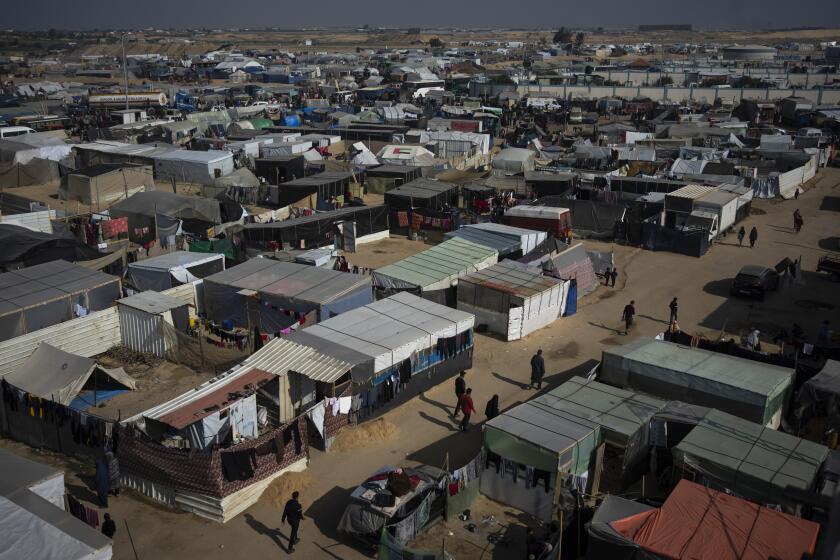Profile : Speaking Her Mind on Women’s Rights : Nawal Saadawi is everything a good Arab woman isn’t supposed to be. And now Cairo is trying to muzzle her.
In a country where large numbers of little girls are still circumcised with a grandmother’s knife blade, she talks about the right of women to enjoy sex. In a city where many women incline either toward a demure head scarf or spike heels, she sports a shock of lawless white hair and baggy trousers. Her husband does the laundry while she writes articles about how husbands shouldn’t be allowed to take a second wife without the first wife’s permission.
Much of this verges on the heretical in Egypt, where decades of Westernization have brought discotheques, hamburger stands, video shops and women doctors but where centuries of tradition still hold that it’s not nice to have sex with a man unless you’re married to him.
Nawal Saadawi, brash, frank, liberal, bossy, fond of public attention--everything a good Arab woman isn’t supposed to be--is both Egypt’s best-known feminist and the one it’s most embarrassed about. Islamic fundamentalists despise her, and many other feminists say she espouses the right issues in the wrong way.
“She upsets a lot of decent folks with her way of bringing up, you know, sex in every discussion,” Cairo Today wrote recently.
But Saadawi, well-known novelist and controversial head of the Arab Women’s Solidarity Assn., didn’t go too far--until she went to Baghdad last January to protest the impending Gulf War and the use of non-Arab troops to solve what Arab leaders insisted was an Arab problem.
Her well-known voice, protesting the presence of American soldiers in the region, was broadcast by the BBC back to Egypt, which had dispatched thousands of its own troops to fight alongside the Americans.
Last month, the Egyptian government suddenly notified Saadawi that the national chapter of her international women’s organization, with branches in seven Arab countries, was being dissolved. The government ordered its assets, which it estimated at about $2 million, turned over to a league of “Islamic women.”
Publication of the group’s monthly Al Noon magazine, which printed articles against the Gulf War and criticized allied Arab governments for their policies toward women, was halted.
And Saadawi, jailed for her outspokenness during the reign of former President Anwar Sadat, finds herself in the hot seat once again.
“If you don’t defend ideas and attitudes and policies which are the official ones, and if you are outspoken also, then immediately you are dangerous,” she said.
The issue has focused attention on Egypt’s 27-year-old law on associations, which in this seemingly most democratic country of the Arab world still prohibits political or religious discussions by “any institution.”
The order dissolving the AWSA “represents a new assault on the freedom of association which is already severely restricted in Egypt,” said the Egyptian Organization for Human Rights.
“The dissolution order is very much connected to Dr. Saadawi’s positions, particularly her opposition to the Gulf War,” added organization attorney Niguad Barari, who is representing her. “Also, the mood of the government is very much now one of appeasement to Islamic fundamentalism, which is another reason to clamp down on Nawal Saadawi and her feminist positions.”
Saadawi has been criticized by other feminists in Egypt for being domineering--young office women have been seen cowering at her commands--for arguing the unfairness of punishing women much more harshly than men for adultery in what is still a strictly Islamic country and for dominating, along with her writer-husband, pages of the AWSA’s publications.
But at the same time, her novels, articles and seminars have pinpointed many of the issues with which mainstream feminists have long been concerned.
Saadawi has argued, for example, for changes in Egypt’s family law, which was made more conservative as a concession to fundamentalists in 1985. Before then, a woman who objected to her husband’s taking a second wife was entitled to an automatic divorce. (Islamic law allows a man up to four wives.) Now, a woman must go to court and prove that she would be substantially damaged by her husband’s second marriage.
The problem, said Saadawi, who is trained as a psychiatrist, is that judges too often consider only economic harm to the first wife. “They know nothing about the psychological harm, the emotional harm of having another woman in the house.”
Saadawi complained that an Egyptian woman cannot work if her husband is opposed and cannot renew her passport without her husband’s permission. “This marriage law is a slave law,” she said.
“Women’s issues are very, very sensitive issues in Middle Eastern countries because they’re related to traditional values and because you can’t deal with women’s issues unless you question the whole structure of society,” said Saadawi’s husband of 27 years, Sherif Hetata, a medical doctor and novelist.
Mustafa Amin, a well-known columnist with the pro-government newspaper Akbar el Yom, has come to Saadawi’s defense, arguing vociferously that private organizations should be allowed to discuss politics. He said it was politics, not simply feminism, that got Saadawi in trouble.
Women’s and family issues have never seemed particularly troublesome to the government--President Hosni Mubarak’s regime is generally considered a relatively progressive one which has made concessions to Islamic fundamentalists in the interest of stability. What does trouble the government, though, is political dissent, particularly at a time of instability like that created by the Gulf crisis.
Saadawi’s organization held an international conference on Arab women and the press last fall and issued a declaration criticizing the intervention of foreign troops.
A short time later, she got an official-looking letter from the Ministry of Social Affairs of the Cairo governorate.
“Greetings,” it began. “We would like it to be known to you that all associations and organizations that are regulated with this directorate are not allowed to discuss politics or matters related to religion. This is according to Article 3 of the Statutes of Organizations which are related to the Ministry of Social Affairs: ‘It is not permitted for any institution to discuss politics or religious affairs.’ ”
Saadawi had already been battling the government over publication of AWSA’s monthly magazine, Al Noon, whose name comes both from the ancient Egyptian goddess of the universe and the Arabic letter used to change a masculine word to a feminine one.
The magazine had never received an official permit to publish but was being printed unofficially as an internal organ of the organization, not for sale on the streets. Then, Saadawi began printing articles critical of foreign intervention in the Gulf and praising a group of women in Saudi Arabia who had defied years of tradition and religious edicts by driving cars through downtown Riyadh.
Saudi Arabia was a close ally of Egypt during the crisis, and criticism of allied governments is rare in the Arab press. Criticizing the chief clerics of Saudi Arabia, home of Islam’s two holiest shrines, is even rarer.
“Who said that Islam forbids women to drive cars?” the article demanded. “Does Islam permit, in the eyes of Saudi officials, for American women to drive military vehicles in defense of Islamic holy places and Saudi national interests, while Saudi women remain closeted behind their veils, unable even to drive their children to school after their husbands have gone to the front?”
Al Noon’s printer was told the magazine was unlicensed, and he refused to continue printing it, Saadawi said.
When the order of dissolution followed in mid-July, the Islamic press chortled. “Islamic circles in Egypt greeted the decision with the assurance that Islam is capable of fighting argument with argument, and of confronting deviant thought,” wrote the newspaper, Al Umma al Islamiya.
Government officials refused to be interviewed on the subject, but in a letter on the case published in a leading Cairo daily, Gen. Abdel Raouf Abdelrahman, deputy governor for the eastern district of Cairo, said the authorities were responding to complaints filed by an AWSA board member about money placed in outside accounts under Saadawi’s name. The official said the AWSA also violated the law by failing to record in its minutes conferences held by the organization and its publishing activities.
“The principal reason for dissolving the organization was due to its financial and legal violations . . . and not to political considerations,” Abdelrahman said.
A former member of the AWSA, who asked not to be identified, said some members had long been concerned that grant proceeds often went to members of Saadawi’s family. Saadawi dismisses these complaints, saying they come from disgruntled former colleagues. And her lawyer said the majority of the association’s money, which comes from donations, subscriptions and grants from organizations like UNESCO and the Ford Foundation, is accounted for strictly through the granting agencies.
Attorney Barari said the money held in a separate account legally belongs to the international AWSA, which is registered through the United Nations and the Egyptian Foreign Ministry. The funds were not connected with the Egyptian chapter, he added. The total amount of money involved, both he and Saadawi claim, is less than $20,000--nowhere near the $2 million claimed by the government.
“We have dealt with women’s issues from a standpoint that is very different from even the liberal stand that is taken in Egypt--problems like sex and marriage and the family, what is the place of women in religion--and this makes people uncomfortable,” Saadawi said.
“Under Sadat, I was on the blacklist. Now, I’m on the gray list. I can’t appear on television. There is complete silence in the press about my books. The left wing and I have differences; they say I speak about patriarchy and I don’t speak about class. In fact, we are against class and patriarchy, but if you’re not with them, you must be against them. They don’t really understand true democracy.”
More to Read
Sign up for Essential California
The most important California stories and recommendations in your inbox every morning.
You may occasionally receive promotional content from the Los Angeles Times.






